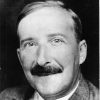Quotations about:
label
Note not all quotations have been tagged, so Search may find additional quotes on this topic.
You know not, will not know, what Christians are;
Their pride is to be Christians, never men;
Ay, even that which since their Founder’s time
Hath tinged their superstition with a touch
Of pure humanity, is prized by them
Never because ’tis human, but because
‘Twas preached and practised by their Jesus Christ.
‘Tis well for them he was so rare a man;
Well that they take his virtues upon trust;
But what to them the virtues of their Christ?
‘Tis was not his virtues, but his name alone
They seek to spread, that it may dominate
And cloud the names of other noble men;
Ay, ’tis the name, the name of Christ alone
Your Christian cares about.[Du kennst die Christen nicht, willst sie nicht kennen.
Ihr Stolz ist: Christen sein; nicht Menschen. Denn
Selbst das, was, noch von ihrem Stifter her,
Mit Menschlichkeit den Aberglauben würzt,
Das lieben sie, nicht weil es menschlich ist:
Weil’s Christus lehrt; weil’s Christus hat getan.—
Wohl ihnen, daß er so ein guter Mensch
Noch war! Wohl ihnen, daß sie seine Tugend
Auf Treu und Glaube nehmen können!—Doch
Was Tugend?—Seine Tugend nicht; sein Name
Soll überall verbreitet werden; soll
Die Namen aller guten Menschen schänden,
Verschlingen. Um den Namen, um den Namen
Ist ihnen nur zu tun.]Gotthold Lessing (1729-1781) German playwright, philosopher, dramaturg, writer
Nathan the Wise [Nathan der Weise], Act 2, sc. 1 [Sittah] (1779) [tr. Maxwell (1917)]
(Source)
(Source (German)). Alternate translations:
You do not know the christians.
You will not know them. 'Tis this people's pride
not to be men, but to be christians. Even
what of humane their founder felt, and taught,
and left to savour their fond superstition,
they value not because it is humane,
lovely, and good for man; they only prize it
because 'twas Christ who taught it, Christ who did it.
'Tis well for them he was so good a man:
well that they take his goodness all for granted,
and in his virtues put their trust. His virtues --
'Tis not his virtues, but his name alone
they wish to thrust upon us. -- 'Tis his name
which they desire should overspread the world,
should swallow up the name of all good men,
and put the best to shame. Tis his mere name
they care for --
[tr. Taylor (1790)]
Thou dost not know the Christians, wilt not know them.
Their pride, that is: the Christian; not the Man.
For even what, still coming from their founder,
With human worth, imbibes their superstition,
Is not adored by them, because 'tis human:
No, but because Christ taught, Christ acted so. --
'Tis well for them, that yet so good a man
He was! 'Tis well for them, that they may take
His virtue granted, and on faith! -- But what
Of virtue! -- Not his Virtue; no, his Name
They wish to spread all o'er the world; his name
Shall stigmatize the names of all good men,
And swallow them. The name, and but the name, --
That's what they cherish.
[tr. Reich (1860)]
You do not, will not, know the Christian race.
It is their pride not to be men, but Christians.
The virtue which their founder felt and taught,
The charity He mingled with their creed,
Is valued, not because it is humane,
And good, and lovely, but for this alone,
That it was Christ who taught it, Christ who did it.
;Tis well for them He was so good a man.
Well that they take His goodness all on trust.
And in His virtues put their faith. His virtues!
'Tis not His virtues, but His name alone
They wish to thrust upon us -- His mere name,
Which they desire should overspread the world,
Should swallow up the name of all good men.
And put the rest to shame. 'Tis for His name
Alone they care.
[tr. Boylan (1878)]
Thou knowest not the christians, will'st not know them:
Their pride is to be Christians, and not men.
For even that which from their Founder's time
Seasons their superstition with humanity, --
That love they not because 'tis human; -- no,
Because Christ taught it and Christ practised it.
'Tis well for them that he was really such
A good man! Well, that they can take on trust
His virtue! Yet what speak I of his virtue?
'Tis not his virtue, 'tis his name alone,
That over all the earth shall spread abroad,
To put to scorn and swallow up the name
Of every other good man. 'Tis the name,
The name alone they care for, they.
[tr. Corbett (1883)]
Thou knowest the Christians not -- wilt not know them.
Their pride is to be Christians -- not men. For
Even that humanity, which by their Founder
Was rooted in their superstition, that love they
Not because it is humane, but because
He taught it -- because so Christ hath done.
Tis well for them He was indeed so
Good a man. 'Tis well for them that they
His virtue can accept on faith, and on belief.
His virtue say I? Not His virtue. His name alone
Shall over all be spread, and shall the name
Of all good men shame and destroy. The name --
And nothing but the name -- is their concern.
[tr. Jacks (1894)]
You do not know the Christians, don’t want to know them. Their pride is to be Christians, not men. Because even what leavens superstition with mitigating aspects, -- dating back to their founder -- they don’t love because it is human. (They love it) because Christ teaches it, because Christ has done it. Lucky they that such a good man existed yet! Lucky they that they can take his virtue on faith and belief! But what virtue? Not his virtue, his name is to be propagated everywhere, is to desecrate the name of all good men, devour it. For the name, for the name only, they care.
[tr. Reinhardt (1950)]
You do not know the Christians, will not know them.
Their pride is to be Christians, and not men.
For even that which from their Founder’s day
With human nature spices superstition
They don’t love for its human worth: because
Their Jesus taught it, by him it was done. --
O well for them, that he was a good man!
And well for them, that they can take his virtue
On faith! -- But what of virtue? -- It’s not that
Shall overspread the world, but just his name;
That name shall swallow all the names of men,
Put them to shame. The name, the name alone,
Is all they care for.
[tr. Morgan (1955), l. 72ff]
You don't know Christians, and you'll never know them. Their pride's not to be men, its to be Christians. Even humanity -- which from the days of their dear Lord Jesus Christ has lessened superstition -- they love, not for its human quality, but only because Christ taught it and showed it in His deeds. It is indeed a blessing that He was so good a man, a man in whose virtues they can place their entire faith! But are His virtues really theirs? No, not at all, it's not His virtues but His name that they attempt to spread throughout the world and, in so doing, cloud with slander and obliterate the names of all good men. The name alone is everything to these Christians.
[tr. Ade (1972)]
From my point of view, no label, no slogan, no party, no skin color, and indeed no religion is more important than the human being.
James Baldwin (1924-1987) American novelist, playwright, activist
Comment (1963)
(Source)
Included in Karen Thorsen, et al., James Baldwin: The Price of the Ticket, film (1989), a film biography of Baldwin using extensive archival film of the author (the project was started before Baldwin's death, and Baldwin intended to direct it).
I have found, without good citation, two broader contexts for the quotation. First:
The very dangerous effort one has got to make, according to me, is to deal with other people as though they were simply human beings. To remember that no matter what the details of their lives may be like, or how different they may seem to you superficially, or what the social pressures outside of what the psychological pressures are within, to deal with this other human being precisely as though he or she was here for the first and only time. To deal with them in some way that you’d like them to deal with you, no matter the price. From my point of view, no label, no slogan, no party, no skin color, and indeed no religion, is more important than the human being. The human core in everybody, which liberates you and me, because when the chips are down this is all there is -- there isn’t anything else.
The second looks to be a paraphrase of the above:
We must all make the effort to deal with all people simply as human beings. From my point of view, no label, no slogan, no party, no skin color, and indeed no religion is more important than the human being. When the chips are down, this is all that matters.
Without better documentation, I cannot confirm either version.
We must not allow Negroes to be men, lest we ourselves should be suspected of not being Christians.
Charles-Lewis de Secondat, Baron de Montesquieu (1689-1755) French political philosopher
The Spirit of Laws [De l’esprit des lois], Vol. 1, Book 15, ch. 5 (1748)
In a satirical set of justifications for slavery of Africans (an institution Montesquieu generally condemned).
This form of the phrase was commonly used by American abolitionists, e.g., used as an epigram in Lydia Maria Child, An Appeal in Favor of That Class of Americans Called Africans, ch. 6 (1836).
French original text:
Il est impossible que nous supposions que ces gens-là soient des hommes, parce que, si nous les supposions des hommes, on commencerait à croire que nous ne sommes pas nous-mêmes chrétiens.
Alternate translations:
It is impossible for us to suppose these creatures to be men, because allowing them to be men, a suspicion would follow, that we ourselves are not Christians.
[tr. Nugent (1758 ed.)]
It is impossible for us to assume that these people are men because if we assumed they were men one would begin to believe that we ourselves were not Christians.
[tr. Cohler/Miller/Stone (1989)]
So all fathers took all sons out for walks in the woods one Sunday afternoon. The next day, Monday, we were playing in the fields and this boy said to me, “See that bird standing on the stump there? What’s the name of it?”
I said, “I haven’t got the slightest idea.” He said, ‘It’s a brown-throated thrush. Your father doesn’t teach you much about science.”
I smiled to myself, because my father had already taught me that [the name] doesn’t tell me anything about the bird. He taught me “See that bird? It’s a brown-throated thrush, but in Germany it’s called a halsenflugel, and in Chinese they call it a chung ling and even if you know all those names for it, you still know nothing about the bird — you only know something about people; what they call that bird. Now that thrush sings, and teaches its young to fly, and flies so many miles away during the summer across the country, and nobody knows how it finds its way,” and so forth. There is a difference between the name of the thing and what goes on.
Richard Feynman (1918-1988) American physicist
“What is Science?” speech, National Science Teachers Association, New York City (1966)
(Source)
Reprinted in The Physics Teacher, Vol. 7, issue 6 (Sep 1969)
Feynman spoke often about his father, Melvin, and the early science education he got from him. The final phrase above shows up frequently in Feynman's writings and lectures. Variations of the overall story show up in biographies and references, including this version from his autobiographical What Do You Care What Other People Think?, ch. 1 (1988) [with Ralph Leighton]:
So it ended up that the other fathers had to take their children for walks the next weekend. The next Monday, when the fathers were all back at work, we kids were playing in a field. One kids says to me, "See that bird? What kind of bird is that?"
I said, "I haven't the slightest idea of what kind of bird it is." He says, "It's a brown-throated thrush. Your father doesn't teach you anything."
But it was the opposite. He had already taught me: "See that bird?" he said. "It's a Spencer's warbler." (I knew he didn't know the real name.) "Well, in Italian, it's a Chutto Lapittida. In Portuguese, it's a Bom da Peida. In Chinese, it's a Chung-long-tah, and in Japanese it's a Katano Tekeda. You can know the name of that bird in all the languages of the world, but when you're finished, you'll know absolutely nothing whatever about the bird. You'll only know about humans in different places, and what they call the bird. So let's look at the bird and see what it's doing -- that's what counts." (I learned very early the difference between knowing the name of something and knowing something.)
It’s dated, called a fable; men are clever,
But they are just as badly off as ever:
The Evil One is gone, the evil ones remain.[Er ist schon lang in Fabelbuch geschrieben;
Allein die Menschen sind nichts besser dran,
Den Bösen sind sie los, die Bösen sind geblieben.]Johann Wolfgang von Goethe (1749-1832) German poet, statesman, scientist
Faust: a Tragedy [eine Tragödie], Part 1, sc. 9 “Witches’ Kitchen,” l. 2557ff [Mephistopheles] (1808-1829) [tr. Kaufmann (1961)]
(Source)
On humanity no longer believing in "Satan."
Some translations (and this site) include the Declaration, Prelude on the Stage, and Prologue in Heaven as individual scenes; others do not, leading to their Part 1 scenes being numbered three lower.
(Source (German)). Alternate translations:
This many a day 'tis written down a fable;
Yet men are nowise winners in the game.
They're rid of the Evil One, the Evil still are able.
[tr. Latham (1790)]
That's been known as a fable many a season;
But men have things no better for that reason.
Free are they from the Evil One; the evil are still here.
[tr. Priest (1808)]
It has been long written in story books; but men are not the better for that; they are rid of the wicked one, the wicked have remained.
[tr. Hayward (1831)]
To fable-books it now doth appertain;
But people from the change have nothing won.
Rid of the evil one, the evil ones remain.
[tr. Swanwick (1850)]
It has long since to fable-books been banished;
But men are none the better for it; true,
The wicked one, but not the wicked ones, has vanished.
[tr. Brooks (1868)]
It's long been written in the Book of Fable;
Yet, therefore, no whit better men we see:
The Evil One has left, the evil ones are stable.
[tr. Taylor (1870)]
That name has had its station long assigned
With Mother Bunch; and yet I cannot see
Men are much better for the want of me.
The wicked one is gone, the wicked stay behind.
[tr. Blackie (1880)]
It's now a name for fairy tales and fables;
the people are as miserable as ever --
the Evil One is gone, the evil ones remain.
[tr. Salm (1962)]
It's been consigned to storybooks for youngsters;
Mind you, men are no better off for that.
The Fiend is gone, the fiends are still amongst us.
[tr. Arndt (1976)]
The name has been a myth too long.
Not that man's any better off -- the Evil One
They're rid of, evil is still going strong.
[tr. Luke (1987)]
Since God knows when it belongs to mythology,
But that's hardly improved the temper of humanity.
The Evil One's no more, evil ones more than ever.
[tr. Greenberg (1992)]
It only comes in fairy stories nowadays.
But even so, humanity's no better off --
The Evil One has gone, they've kept their evil ways.
[tr. Williams (1999)]
It’s written in story books, always:
Men are no better for it, though:
The Evil One’s gone: the evil stays.
[tr. Kline (2003)]
A “communist/socialist/progressive” is an oxymoron, like an “atheist/evangelical Christian/Muslim.”
Hendrik Hertzberg (b. 1943) American journalist, editor, speech writer, political commentator
“Ask the Author Live: Hendrik Hertzberg on George Soros,” The New Yorker (19 Nov 2010)
(Source)
To describe someone as a “criminal” is both to mark that person with a terrifying permanent character trait and simultaneously to place the person outside the circle of “us.” They are criminals. We make mistakes.
Jason Stanley (b. 1969) American philosopher, epistemologist, academic
How Fascism Works: The Politics of Us and Them, ch. 7 (2018)
(Source)
Under normal circumstances, the name a human being bears is no more than the band is to a cigar: a means of identification, a superficial, almost unimportant thing that is only loosely related to the real subject, the true ego. In the event of a success the name begins to swell, so to say. It loosens itself from the human being that bears it and becomes a power in itself, a force, an independent thing, an article of commerce, a capital asset; and psychologically again with strong reaction it becomes a force which tends to influence, to dominate, to transform the person who bears it.
Stefan Zweig (1881-1942) Austrian novelist, playwright, journalist, biographer
The World of Yesterday [Die Welt von Gestern], ch. 13 (1942)
(Source)
To a linguist, the phenomenon is familiar: the euphemism treadmill. People invent new “polite” words to refer to emotionally laden or distasteful things, but the euphemism becomes tainted by association and the new one that must be found acquires its own negative connotations. “Water closet” becomes “toilet” (originally a term for any body care, as in “toilet kit”), which becomes “bathroom,” which becomes “rest room,” which becomes “lavatory.” “Garbage collection” turns into “sanitation,” which turns into “environmental services.” The euphemism treadmill shows that concepts, not words, are in charge. Give a concept a new name, and the name becomes colored by the concept; the concept does not become freshened by the name. (We will know we have achieved equality and mutual respect when names for minorities stay put.)
Steven Pinker (b. 1954) Canadian-American cognitive psychologist, linguist, author
“The Game of the Name,” New York Times (5 Apr 1994)
(Source)
I myself have never been able to find out what feminism is; I only know that people call me a feminist whenever I express sentiments that differentiate me from a doormat or a prostitute.
Rebecca West (1892-1983) British author, journalist, literary critic, travel writer [pseud. for Cicily Isabel Fairfield]
“Mr. Chesterton in Hysterics,” The Clarion (14 Nov 1913)
(Source)
The American People will take Socialism, but they won’t take the label. I certainly proved it in the case of EPIC. Running on the Socialist ticket I got 60,000 votes, and running on the slogan to “End Poverty in California” I got 879,000. I think we simply have to recognize the fact that our enemies have succeeded in spreading the Big Lie. There is no use attacking it by a front attack, it is much better to out-flank them.
Upton Sinclair (1878-1968) American writer, journalist, activist, politician
Letter to Norman Thomas (25 Sep 1951)
(Source)
Categories, if you’ll excuse a brief digression, are a useful way to get a handle on things you don’t understand, as long as you don’t get too attached to them and forget that things like to pop out of one category and into another, and that sometimes the whole category turns itself inside out and becomes something different. It’s useful, for example, to categorize your target as a sorcerer, if he is one; but if you get too attached to your category it’ll leave you embarrassed when he suddenly pulls a knife on you.
More to the point, nameless hideous monsters are freaking terrifying. You always fear what you don’t know, what you don’t understand, and the first step to having understanding of something is to know what to call it. It’s a habit of mine to give names to anything I wind up interacting with if it doesn’t have one readily available. Names have power — magically, sure, but far more important, they have psychological power. Something horrible with a name holds less power over you, less terror, than something horrible without one.
“Octokongs,” I pronounced grimly. “Why did it have to be octokongs?”
JULIET: What’s in a name? That which we call a rose
By any other word would smell as sweet.William Shakespeare (1564-1616) English dramatist and poet
Romeo and Juliet, Act 2, sc. 2, l. 46ff (2.2.46-47) (c. 1594)
(Source)

















